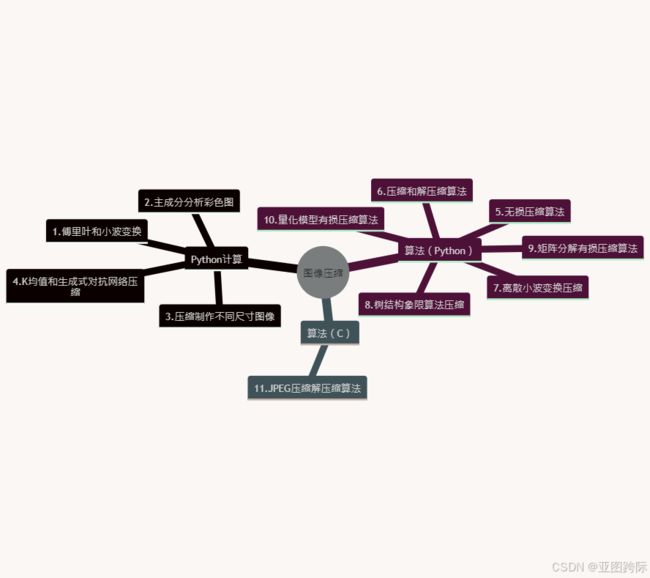Python(C)图像压缩导图
要点
- 傅里叶和小波变换
- 主成分分析彩色图
- 压缩制作不同尺寸图像
- K均值和生成式对抗网络压缩
- 无损压缩算法
- 压缩和解压缩算法
- 离散小波变换压缩
- 树结构象限算法压缩
- 矩阵分解有损压缩算法
- 量化模型有损压缩算法
- JPEG压缩解压缩算法

Python图像压缩
图像压缩可以是有损的,也可以是无损的。无损压缩是档案用途的首选,通常用于医学成像、技术图纸、剪贴画或漫画。有损压缩方法,尤其是在低比特率下使用时,会产生压缩伪影。有损方法特别适用于自然图像,例如照片,在这种应用中,可以接受轻微(有时难以察觉)的保真度损失,以实现比特率的大幅降低。产生可忽略不计的差异的有损压缩可以称为视觉无损。
在给定压缩率(或比特率)下获得最佳图像质量是图像压缩的主要目标,但是,图像压缩方案还有其他重要属性:
可伸缩性通常是指通过操纵比特流或文件(无需解压和重新压缩)实现的质量降低。可伸缩性的其他名称是渐进式编码或嵌入式比特流。尽管其性质相反,但可伸缩性也可以在无损编解码器中找到,通常以从粗到细的像素扫描形式出现。可伸缩性对于在下载图像时预览图像(例如,在 Web 浏览器中)或提供对数据库等的可变质量访问特别有用。可伸缩性有几种类型:
- 质量渐进或层渐进:比特流连续细化重建图像。
- 分辨率渐进:首先编码较低的图像分辨率;然后将差异编码为更高分辨率。
- 分量渐进:首先编码灰度版本;然后添加全色。
感兴趣区域编码:图像的某些部分的编码质量高于其他部分。这可以与可扩展性相结合(首先对这些部分进行编码,然后再对其他部分进行编码)。元信息:压缩数据可能包含有关图像的信息,可用于对图像进行分类、搜索或浏览。此类信息可能包括颜色和纹理统计信息、小预览图像以及作者或版权信息。
处理能力:压缩算法需要不同数量的处理能力来编码和解码。一些高压缩算法需要高处理能力。
压缩方法的质量通常用峰值信噪比来衡量。它衡量的是图像有损压缩引入的噪声量,然而,观看者的主观判断也被视为一项重要衡量标准,或许是最重要的衡量标准。
在我们深入压缩图像之前,让我们创建一个函数,以友好的格式打印文件大小:
def get_size_format(b, factor=1024, suffix="B"):
for unit in ["", "K", "M", "G", "T", "P", "E", "Z"]:
if b < factor:
return f"{b:.2f}{unit}{suffix}"
b /= factor
return f"{b:.2f}Y{suffix}"
接下来,让我们来制作压缩图像的核心函数:
def compress_img(image_name, new_size_ratio=0.9, quality=90, width=None, height=None, to_jpg=True):
img = Image.open(image_name)
print("[*] Image shape:", img.size)
image_size = os.path.getsize(image_name)
print("[*] Size before compression:", get_size_format(image_size))
if new_size_ratio < 1.0:
img = img.resize((int(img.size[0] * new_size_ratio), int(img.size[1] * new_size_ratio)), Image.ANTIALIAS)
print("[+] New Image shape:", img.size)
elif width and height:
img = img.resize((width, height), Image.ANTIALIAS)
print("[+] New Image shape:", img.size)
filename, ext = os.path.splitext(image_name)
if to_jpg:
new_filename = f"{filename}_compressed.jpg"
else:
new_filename = f"{filename}_compressed{ext}"
try:
img.save(new_filename, quality=quality, optimize=True)
except OSError:
img = img.convert("RGB")
img.save(new_filename, quality=quality, optimize=True)
print("[+] New file saved:", new_filename)
new_image_size = os.path.getsize(new_filename)
print("[+] Size after compression:", get_size_format(new_image_size))
saving_diff = new_image_size - image_size
print(f"[+] Image size change: {saving_diff/image_size*100:.2f}% of the original image size.")
现在我们已经有了核心函数,让我们使用 argparse 模块将其与命令行参数集成:
if __name__ == "__main__":
import argparse
parser = argparse.ArgumentParser(description="Simple Python script for compressing and resizing images")
parser.add_argument("image", help="Target image to compress and/or resize")
parser.add_argument("-j", "--to-jpg", action="store_true", help="Whether to convert the image to the JPEG format")
parser.add_argument("-q", "--quality", type=int, help="Quality ranging from a minimum of 0 (worst) to a maximum of 95 (best). Default is 90", default=90)
parser.add_argument("-r", "--resize-ratio", type=float, help="Resizing ratio from 0 to 1, setting to 0.5 will multiply width & height of the image by 0.5. Default is 1.0", default=1.0)
parser.add_argument("-w", "--width", type=int, help="The new width image, make sure to set it with the `height` parameter")
parser.add_argument("-hh", "--height", type=int, help="The new height for the image, make sure to set it with the `width` parameter")
args = parser.parse_args()
print("="*50)
print("[*] Image:", args.image)
print("[*] To JPEG:", args.to_jpg)
print("[*] Quality:", args.quality)
print("[*] Resizing ratio:", args.resize_ratio)
if args.width and args.height:
print("[*] Width:", args.width)
print("[*] Height:", args.height)
print("="*50)
compress_img(args.image, args.resize_ratio, args.quality, args.width, args.height, args.to_jpg)
现在使用我们的脚本。首先,让我们使用不带任何参数的脚本:
$ python compress_image.py sample-images.png
输出:
==================================================
[*] Image: sample-images.png
[*] To JPEG: False
[*] Quality: 90
[*] Resizing ratio: 1.0
==================================================
[*] Image shape: (953, 496)
[*] Size before compression: 425.65KB
[+] New file saved: sample-images_compressed.png
[+] Size after compression: 379.25KB
[+] Image size change: -10.90% of the original image size.
图像大小从 425.65KB 减少到 379.25KB,减少了约 11%。接下来,让我们尝试传递 -j 以将 PNG 转换为 JPEG:
$ python compress_image.py sample-images.png -j
输出:
==================================================
[*] Image: sample-images.png
[*] To JPEG: True
[*] Quality: 90
[*] Resizing ratio: 1.0
==================================================
[*] Image shape: (953, 496)
[*] Size before compression: 425.65KB
[+] New file saved: sample-images_compressed.jpg
[+] Size after compression: 100.07KB
[+] Image size change: -76.49% of the original image size.
提高了 76.5%。让我们稍微降低质量:
$ python compress_image.py sample-satellite-images.png -j -q 75
输出:
==================================================
[*] Image: sample-images.png
[*] To JPEG: True
[*] Quality: 75
[*] Resizing ratio: 1.0
==================================================
[*] Image shape: (953, 496)
[*] Size before compression: 425.65KB
[+] New file saved: sample-images_compressed.jpg
[+] Size after compression: 64.95KB
[+] Image size change: -84.74% of the original image size.
在不影响原始图像分辨率的情况下减少约 85%。让我们尝试将图像的宽度和高度乘以 0.9:
$ python compress_image.py sample-satellite-images.png -j -q 75 -r 0.9
输出:
==================================================
[*] Image: sample-images.png
[*] To JPEG: True
[*] Quality: 75
[*] Resizing ratio: 0.9
==================================================
[*] Image shape: (953, 496)
[*] Size before compression: 425.65KB
[+] New Image shape: (857, 446)
[+] New file saved: sample-images_compressed.jpg
[+] Size after compression: 56.94KB
[+] Image size change: -86.62% of the original image size.
现在设置精确的宽度和高度值:
$ python compress_image.py sample-satellite-images.png -j -q 75 -w 800 -hh 400
输出:
==================================================
[*] Image: sample-images.png
[*] To JPEG: True
[*] Quality: 75
[*] Resizing ratio: 1.0
[*] Width: 800
[*] Height: 400
==================================================
[*] Image shape: (953, 496)
[*] Size before compression: 425.65KB
[+] New Image shape: (800, 400)
[+] New file saved: sample-images_compressed.jpg
[+] Size after compression: 49.73KB
[+] Image size change: -88.32% of the original image size.